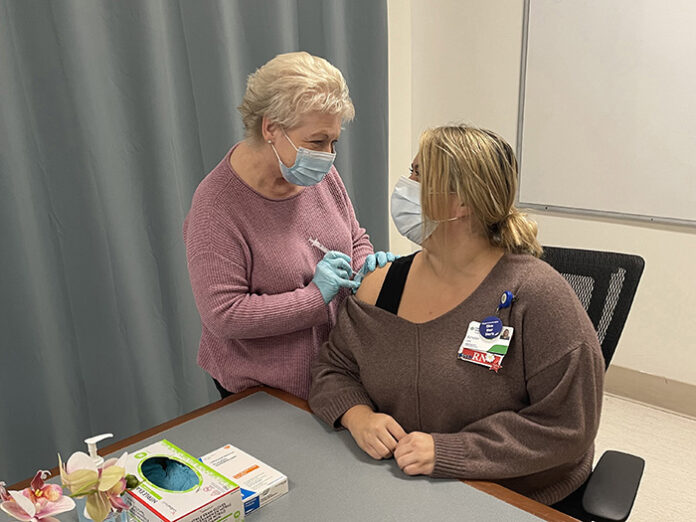
Flu season, generally from Nov. 1 to May 31, arrives this year as Sonoma County continues to fight the ongoing COVID-19 pandemic. Dr. Sundari Mase, the Sonoma County health officer, warned of the potential risks of both viruses circulating in the community at the same time this winter, which could put a strain on hospital resources.
“As Sonoma County works to reduce transmission of COVID-19, influenza season is fast approaching,” Mase said. “The flu and COVID-19 will likely be spreading at the same time, and relaxed COVID-19 mitigation measures may result in an increase in flu activity during the upcoming season. Influenza is preventable with a vaccine that is currently available.”
Also on the radar: a feared increase in respiratory syncytial virus (RSV), which usually affects children under two but can have serious impacts on the health of seniors as well.
As she has in previous years, Mase is arguing for increased vigilance over the coming flu season by recommending flu shots for everyone—and requiring them for health care workers in certain health care and congregate facilities.
“The flu vaccine requirement applies to all workers who have the potential for direct or indirect exposure to patients or residents,” read a press release from the Department of Health Services. “Workers include nurses, physicians, technicians, therapists and pharmacists at such facilities as acute care hospitals, skilled nursing facilities, psychiatric hospitals, dialysis centers, dental offices and others.”
The order takes effect Nov. 1, and workers must be in compliance by Nov. 30. Anyone granted an exemption must wear a surgical mask or respirator at all times while in indoor work settings, according to the health order.
Christina Harris, the communications manager of Healdsburg Hospital, Providence, told the Tribune that the hospital was “encouraging caregivers to get their flu shots ahead of our annual Oct. 31 compliance deadline.” She said that flu vaccinations began to be given at the end of September, and the process should have been completed by Oct. 31.
“Our team will visit each unit to give the vaccines. If a caregiver cannot get a flu shot, they must submit a declination form, in line with … the health order. Participation in our flu program is required, either through vaccination or declination by our Oct. 31 deadline.”
Matt Brown, the Department of Health Services communications officer, clarified that this requirement is not a new one this year. “This is not a new health order. Sonoma County’s health officer has issued a flu vaccine health order for health care workers since at least 2017.”
The order is enforceable under the health officer’s powers in the state health and safety code.
Mase also issued a strong recommendation that the general public, including first responders, get the flu vaccine this flu season. “First responders who decline to get the influenza vaccine are strongly encouraged to wear a medical-grade mask when interacting with the public or while working indoors.”
Flu vaccines are widely available through primary health care providers, health clinics, pharmacies and some COVID vaccine clinics.
Some health care professionals are also concerned about a possible “tri-demic,” with an outbreak of respiratory syncytial virus (RSV) added to the mix. RSV usually affects children under two, though anyone can contract the ailment. Adults 65 and over and adults with chronic conditions or weakened immune systems are at high risk for developing severe RSV.
Mase agrees, and has outlined the following precautions: “To prevent spread or becoming infected: Cover your cough and sneezes with tissue or the upper part of your shirt; wash your hands; avoid close contact with others; clean frequently touched surfaces; avoid interacting with people with cold like symptoms, especially children at risk for severe RSV, including premature infants, children under two years with chronic lung or heart conditions and children with weakened immune systems.”For additional health information, visit sonomacounty.ca.gov/health-and-human-services/health-services.







